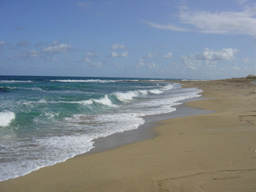
Unspoiled shore
On the Libyan side of the border we are kept waiting for two hours at the outpost. Our visas are okay, but that doesn't mean that you may enter the country driving your own vehicle.There are intense phone calls between the Ministry of the Interior in Tripoli and the border police. Tourists with their own car and without a government appointed guide? This is something absolutely rare. Luckily, we can present a letter from the Libyan ambassador in Germany confirming our allowance to enter Libya with our own vehicle. Finally we are given permission by the officials over the phone to enter and are quite relieved to drive to the next stop: the clearance station. But tourists from abroad driving in their own car are still something unheard of in this clearance system. For three hours we make small talk with numerous border officials and try to speed up the required paperwork step by step. In the end the officials discover that there are no Libyan license plates for us at this crossing-point. We are escorted to the traffic police in the hinterland and our vehicle is parked in the yard. Nothing happens for an hour and the local officers obviously assume no responsibility. Fortunately it is Ramadan and they are impatiently waiting, as all Moslems in the Islamic world, for the sun to go down so that they can finally get something to eat and drink again. Nothing would be worst than to delay this social ceremony because of us, and suddenly all problems solve themselves at dusk. An old license plate is found in a garage and the registration papers for our land cruiser are quickly filled out. They even allow us seven days to pay the fees when we leave the country because we don't have enough Libyan money with us. What a bureaucratic miracle! Exactly at the Muezzin's call we leave the police station and hurry in the darkness to find a halfway safe place to set up camp.
Having a transit visa for seven days gives us only a short time in Libya. We therefore decide to drive along the coast of the Mediterranean Sea via Benghazi, Sirt and Tripoli on the way to Tunisia. Unfortunately, there is no time for an excursion into the desert and we aren't sure if the control post in the country's interior would let us pass with a transit visa.
 Unspoiled shore |
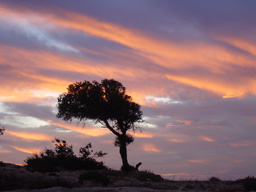 At sundown |
To begin with we visit the 2,600-year-old ruins of the Greek city of Cerene, located in the very beautiful rugged Jebel Akhdar. Near-by you find the port of Apollonia. The first settlers came from Santorini Island to this place to find room for the quickly growing population. Tourists can still find the wonderful amphitheater, temples for Apollo and Zeus and much more.
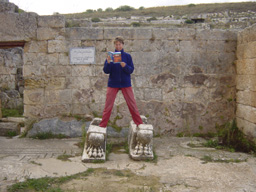 Reading |
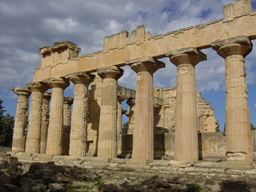 Zeus Temple |
Approximately 800 kilometers farther to the west we arrive at the ruins of Leptis Magna, formerly the second largest city of the Roman Empire. 2,500 years ago, the Phoenicians chose this strategic place to conduct sea trade and to control the caravan roads in the Sahara. The huge municipal area with its adjacent harbor is in relatively good condition and you do get a good idea of how life was in ancient times. We are the only tourists around and wander through the old streets, passing the baths, temples, sport arenas, the local theater and the market.
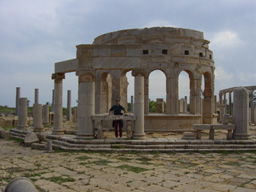 Market |
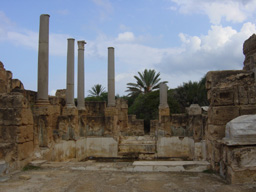 Bath |
Ute especially finds the legend about how Libya was divided intriguing. In the 4th century BC the Romans and the Greeks organized a sports event to settle this political matter. A Roman runner started in the west near Leptis Magna, at the same time a Greek runner started in the east near Cyrene. The meeting point of the two athletes then marked the border of the two empires.
Nowadays we experience Libya as a country obviously affected by the general embargo of the western countries. Even for us, pre-packaged food is very expensive and we ask ourselves how the locals can afford these things. The country looks rather poor to us but the people seem to have maintained their cheerfulness. It is no problem to set up camp on a piece of their land and they even go out to get water for us after dark. The water rarely flows out of a faucet here! Therefore it is very easy and relaxing for us to spend the last week of our tour at the beautifully situated campsites near the coast of the Mediterranean Sea. Only once did we have to fight against an autumn storm that forced us several times in the night to search for torn away tent pegs. Protected campsites are priority number one after this experience.
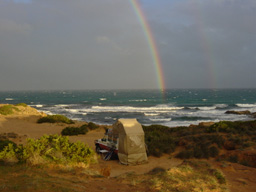 Camp |
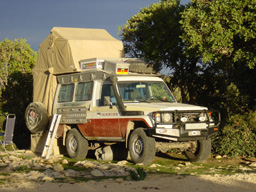 Protected site |
In the hope for a quicker clearance at the border compared to the one when entering the country, we exit Libya at the crossing-point Ras al-Jedir heading towards Tunisia and drive 500 kilometers until we reach the Tunis harbor. Due to visa delays we take the ferry to Marseille departing five days later than the one to Genoa in order to reach Berlin in time for December the 8th (see news ticker on our website's first page!). Surely we will visit Libya again to see the desert landscape. Libya is close enough to spend a normal annual holiday there. However, only with the prerequisite that Libya turns into a normal travel destination again. Almost two years ago the government forbade unorganized tourist expeditions. A first promising step towards an openness to the western world are the Internet cafés that are everywhere in the country even though relevant travel guidebooks still write that Libya has no Internet access.
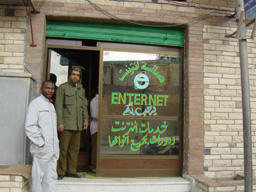 Lybien online |
Before we reach the border, we check our vehicle again to see if it is waterproof. Rain and thunderstorms have flooded many roads so that it is impossible to pass some parts of the coastal road driving in a normal car. Often the water is half a meter high.
Arriving at the Libyan-Tunisian border we are surprised and happy that clearance is quick and easy. After 15 minutes the Libyans stamp our passports and the Tunisian border officers are almost as fast! We cannot believe that our land cruiser and the inside of it are not checked at all.
Now we lodge in a small hotel located at the harbor of Tunis and enjoy the comforts of civilization. We did like to camp out in nature, but a hot shower is nice too!